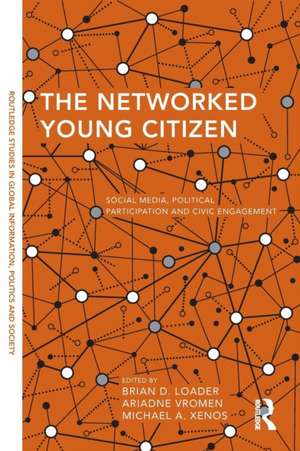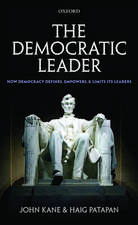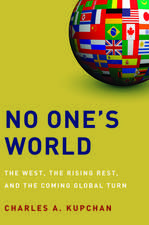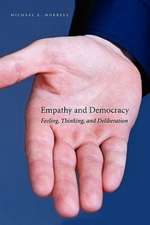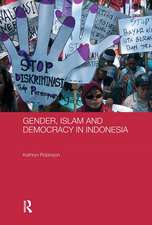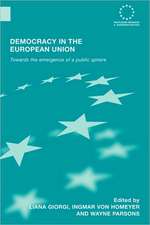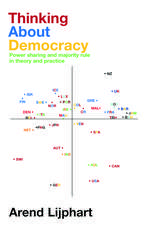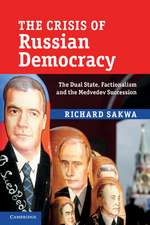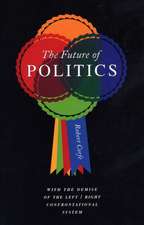The Networked Young Citizen: Social Media, Political Participation and Civic Engagement: Routledge Studies in Global Information, Politics and Society
Editat de Brian D. Loader, Ariadne Vromen, Michael Xenosen Limba Engleză Paperback – 14 iul 2015
This collection, comprising contributions from a number of leading international scholars in this field, examines such themes as the possible effects of social media use upon patterns of political socialization; the potential of social media to ameliorate young people’s political inequality; the role of social media communications for enhancing the civic education curriculum; and evidence for social media manifesting new forms of political engagement and participation by young citizens. These issues are considered from a number of theoretical and methodological approaches but all attempt to move beyond simplistic notions of young people as an undifferentiated category of ‘the internet generation’.
| Toate formatele și edițiile | Preț | Express |
|---|---|---|
| Paperback (1) | 443.47 lei 6-8 săpt. | |
| Taylor & Francis – 14 iul 2015 | 443.47 lei 6-8 săpt. | |
| Hardback (1) | 1113.60 lei 6-8 săpt. | |
| Taylor & Francis – 13 iun 2014 | 1113.60 lei 6-8 săpt. |
Din seria Routledge Studies in Global Information, Politics and Society
-
 Preț: 302.68 lei
Preț: 302.68 lei -
 Preț: 294.19 lei
Preț: 294.19 lei -
 Preț: 309.12 lei
Preț: 309.12 lei -
 Preț: 197.22 lei
Preț: 197.22 lei -
 Preț: 247.46 lei
Preț: 247.46 lei -
 Preț: 422.00 lei
Preț: 422.00 lei -
 Preț: 309.69 lei
Preț: 309.69 lei -
 Preț: 449.41 lei
Preț: 449.41 lei -
 Preț: 446.58 lei
Preț: 446.58 lei -
 Preț: 412.37 lei
Preț: 412.37 lei -
 Preț: 411.98 lei
Preț: 411.98 lei -
 Preț: 413.13 lei
Preț: 413.13 lei - 8%
 Preț: 417.81 lei
Preț: 417.81 lei -
 Preț: 367.83 lei
Preț: 367.83 lei - 26%
 Preț: 763.39 lei
Preț: 763.39 lei - 31%
 Preț: 753.04 lei
Preț: 753.04 lei -
 Preț: 383.63 lei
Preț: 383.63 lei -
 Preț: 360.70 lei
Preț: 360.70 lei -
 Preț: 385.08 lei
Preț: 385.08 lei - 18%
 Preț: 729.58 lei
Preț: 729.58 lei
Preț: 443.47 lei
Nou
Puncte Express: 665
Preț estimativ în valută:
84.87€ • 88.10$ • 70.77£
84.87€ • 88.10$ • 70.77£
Carte tipărită la comandă
Livrare economică 24 martie-07 aprilie
Preluare comenzi: 021 569.72.76
Specificații
ISBN-13: 9781138781146
ISBN-10: 1138781142
Pagini: 228
Ilustrații: 11 black & white tables, 11 black & white line drawings
Dimensiuni: 152 x 229 x 12 mm
Greutate: 0.31 kg
Ediția:1
Editura: Taylor & Francis
Colecția Routledge
Seria Routledge Studies in Global Information, Politics and Society
Locul publicării:Oxford, United Kingdom
ISBN-10: 1138781142
Pagini: 228
Ilustrații: 11 black & white tables, 11 black & white line drawings
Dimensiuni: 152 x 229 x 12 mm
Greutate: 0.31 kg
Ediția:1
Editura: Taylor & Francis
Colecția Routledge
Seria Routledge Studies in Global Information, Politics and Society
Locul publicării:Oxford, United Kingdom
Public țintă
Postgraduate and UndergraduateCuprins
1. Introduction: The Networked Young Citizen: Social Media, Political Participation and Civic Engagement; Brian D. Loader, Ariadne Vromen and Michael Xenos. PART I: Political Culture, Socialization and Social Media Adoption. 2. The Great Equalizer? Patterns of Social Media Use and Youth Political Engagement; Michael Xenos, Ariadne Vromen and Brian D. Loader. 3. Spaces for Public Orientation? Longitudinal Effects of Internet Use in Adolescence; Mats Ekström, Tobias Olsson, and Adam Shehata. 4. Political Influence across Generations: Partisanship and Candidate Evaluations in the 2008 election; Emily Vraga, , Leticia Bode, Jung Hwan Yang, Stephanie Edgerly, Kjerstin Thorson, Chris Wells, and Dhavan V. Shah. 5. Young citizens and the fine art of disengaging online; Kjerstin Thorson. PART II: Civics and Citizenship Education. 6. Australian reflections on learning to be citizens in and with the social web; Suzanne Mellor. 7. Perceptions of students and teachers in England about how social media are used (and how they could be used) in schools and elsewhere; Ian Davies and Edda Sant. PART III: Agency, Mobilization and the Voice of the Young Citizen. 8. "The Outraged Young": Young Europeans, Civic Engagement and the Social Media in a Time of Crisis; James Sloam. 9. The Contribution of Websites and Blogs to the Students’ Protest Communication Tactics during the 2010 UK University Occupations; Yannis Theocharis
Notă biografică
Brian D. Loader is Associate-Director of the Science and Technology Studies Unit (SATSU) based at the University of York, UK. His academic interests are focussed around the emergence of new information and communications technologies (ICTs), such as the Internet, and the social, political and economic factors shaping their development and diffusion, and their implications for social, economic, governmental and cultural change. He is General Editor of the international journal Information, Communication and Society and has published extensively in this field. Recent books include Cyberprotest:New Media, Citizens and Social Movements, (Routledge, 2004); Young Citizens in the Digital Age (Routledge, 2007); Digital Welfare for the Third Age (Routledge, 2008).
Ariadne Vromen is Associate Professor in the Department of Government and International Relations at the University of Sydney, in Australia. She has ongoing research interests in political participation, including on young people, politics and the internet.
Michael Xenos is Associate Professor of Communication Science at the University of Wisconsin-Madison, USA. His research focuses on how the context and content of political communication influences the quality of democratic deliberation, public opinion, and civic engagement. He is particularly interested in how different aspects of political information environments affect processes of opinion formation and civic engagement. Some of his recent projects have explored how factors such as campaign intensity, negative campaigning, new communication technologies, and new sources of political information like late-night comedy and youth political websites, enable or constrain democratic citizenship.
Ariadne Vromen is Associate Professor in the Department of Government and International Relations at the University of Sydney, in Australia. She has ongoing research interests in political participation, including on young people, politics and the internet.
Michael Xenos is Associate Professor of Communication Science at the University of Wisconsin-Madison, USA. His research focuses on how the context and content of political communication influences the quality of democratic deliberation, public opinion, and civic engagement. He is particularly interested in how different aspects of political information environments affect processes of opinion formation and civic engagement. Some of his recent projects have explored how factors such as campaign intensity, negative campaigning, new communication technologies, and new sources of political information like late-night comedy and youth political websites, enable or constrain democratic citizenship.
Recenzii
'This comprehensive collection of studies on networked citizenship covers changes in civic orientations, patterns of media use, modes of participation and organization, socialization and citizenship education, and the emergence of large scale protest. It is the new sourcebook for the field.'— W. Lance Bennett, University of Washington, Seattle
'The growing disconnect between young people and mainstream politics has been emerging as a central motif in the ongoing dilemmas of democracy, yet has all too often been framed by easy generalisations. This impressive volume charts a much more nuanced course; it rigorously probes the idea of ‘the networked young citizen’ both conceptually and empirically. The chapters explore the role of social media in relation to the other key factors that shape young people’s evolving political horizons – and in so doing establish a new frontline in our understanding.'— Peter Dahlgren, Lund University, Sweden
'The contributors represent a wide array of disciplines, methodologies, and nationalities, providing the book a degree of diversity that is compatible with its underlying claim: younger generations engage politics and society as a function of semantic rather than physical proximity. This is echoed by contemporaries such as Malcolm Gladwell (who argues against socially primitive reliance on space and time) and Jakob Nielsen. Summing Up: Recommended. Upper-division undergraduates through faculty.'— N. D. Bowman, West Virginia University, CHOICE
'The growing disconnect between young people and mainstream politics has been emerging as a central motif in the ongoing dilemmas of democracy, yet has all too often been framed by easy generalisations. This impressive volume charts a much more nuanced course; it rigorously probes the idea of ‘the networked young citizen’ both conceptually and empirically. The chapters explore the role of social media in relation to the other key factors that shape young people’s evolving political horizons – and in so doing establish a new frontline in our understanding.'— Peter Dahlgren, Lund University, Sweden
'The contributors represent a wide array of disciplines, methodologies, and nationalities, providing the book a degree of diversity that is compatible with its underlying claim: younger generations engage politics and society as a function of semantic rather than physical proximity. This is echoed by contemporaries such as Malcolm Gladwell (who argues against socially primitive reliance on space and time) and Jakob Nielsen. Summing Up: Recommended. Upper-division undergraduates through faculty.'— N. D. Bowman, West Virginia University, CHOICE
Descriere
This collection, comprising contributions from a number of leading international scholars in this field, examines such themes as the possible effects of social media use upon patterns of political socialization; the potential of social media to ameliorate young people’s political inequality; the role of social media communications for enhancing the civic education curriculum; and evidence for social media manifesting new forms of political engagement and participation by young citizens.
